In these uncertain economic times, marketers are coming under increasing pressure to account for advertising spend.
As we reported in our COVID Tech Stacks Report, this increased focus on advertising efficiency and ROI has driven marketers towards new tools and strategies to track and optimize their digital advertising performance.
One of the simplest ways to increase the efficiency of your advertising is to focus your advertising on those you know are a good fit for the product (lookalike audiences) and stop targeting those who aren’t (ad suppression). These tactics allow you to reach a larger audience of people receptive to what you offer, so you can spend less on digital marketing while improving efficiency.
Lookalike audiences and ad suppression are essential tactics for Google, Pinterest, Instagram, Snapchat, and Facebook ads. However, most marketers execute on these the wrong way:
When creating lookalikes, they manually upload CSVs of their customers. By doing this manually, your customer list is immediately out of date. You’re giving the advertising platforms an incomplete and out of date view into who your best customers are.
When suppressing their ads, they cast the net too wide. For example, a mistake we see often is when a company hides all their ads to past purchasers instead of using ads to cross-sell their other products. For example, let’s say your company sells both toothbrushes and toothpaste. Someone who just purchased a toothbrush shouldn’t be excluded from your toothpaste campaigns.
These problems can be avoided by using Twilio Engage (formerly Segment Personas) and advertising platforms in tandem. By doing so, you’ll be able to:
Automate audience creation and synchronization so that your audience lists are always up to date.
Granularly segment your lists to create “suppression segments”, customers or former customers you may want to advertise to.
In this recipe, we'll show you how you can connect Engage to advertising integrations to increase your advertising efficiency with lookalike audiences and audience suppression. But first, let’s quickly review what we mean by lookalike audience and audience suppression.
What is a lookalike audience?
Lookalike audiences are groups of people on social media who share similarities with your existing customers. By looking at certain characteristics or demographics shared between your existing customers and other social media users, you can identify potential customers to target your ad spend on who are more likely to be interested in your business.
What is audience suppression?
Audience suppression is the opposite of a lookalike audience: it refers to NOT targeting advertisements to groups of people on social media who do NOT share characteristics or similarities with your target audience. This enables you to boost the efficiency of ad spend by making sure that you’re not wasting money targeting users who won’t convert.
Now, let’s move on to how you can create lookalike audiences and use audience suppression with Segment.
Step 1: Add your advertising destination(s)
Login to Segment.
From the left-side navigation bar, click on Destinations, then Add Destination.
Search for Adwords Remarketing Lists, Personas Facebook Custom Audiences, Pinterest Audiences, or Snapchat Audiences and click the Configure Personas Facebook Custom Audiences button.
Follow the instructions to connect it with the Source you’re using (e.g. your website) or mobile app), and connect it to your advertising account.
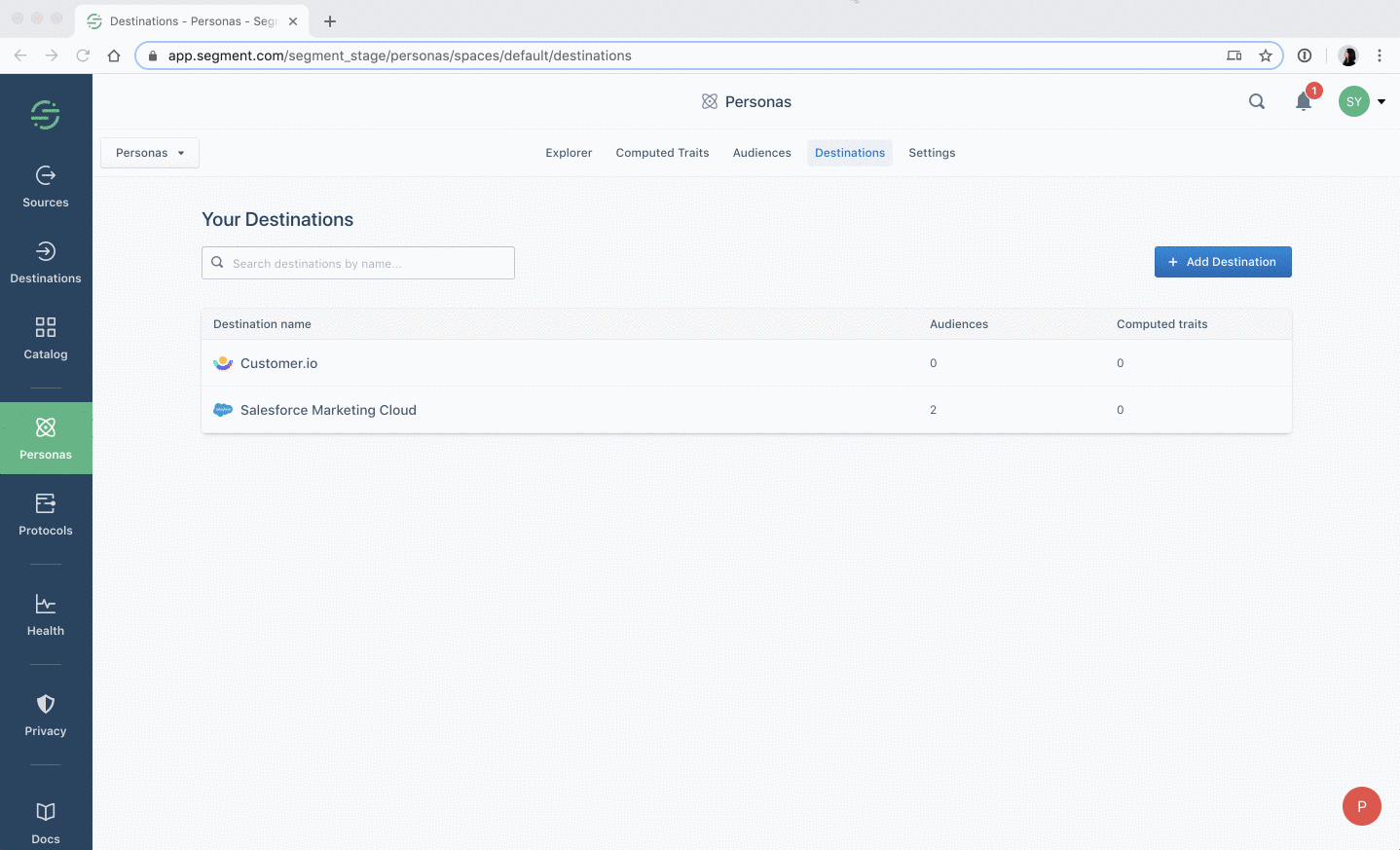
Configure Twilio Engage with your Facebook Ads account
Step 2: Create your custom audience in Engage
As we mentioned earlier, if you crudely exclude all existing customers from your advertising, you’re likely leaving dollars on the table. For example, here are a few profitable audiences you can create with Segment that you may have excluded before.
Upsell to subscriptions: People who purchased a one-off product from you don’t need to see ads for what they just bought. But you can offer a subscription. For example, if a user bought a product off Amazon or Instacart, I could target an audience with ads for Amazon Prime or Instacart Express.
Incentivize referrals: Paid subscribers love you enough to pay you each month. Exclude them from your product-related ads and instead run ads that incentivize them to refer your product to their friends.
Bring back old customers: Former customers are unlikely to respond in the same way to your prospecting ads as people who have never heard of you. Instead of showing lapsed customers ads that tell them what they already know, run distinct ones that highlight recent product improvements to get them to return.
Reactivate disengaged users: Inactive users sometimes need just a little incentive to get them to re-engage. First, spare them from your prospecting ads, so you don’t annoy them with repetition. Next, entice them with discounts or bonus credits.
From your Segment dashboard, click Engage from the left navigation.
Select Audiences, and then click the New Audience button.
In this example, we’ll find all users that have purchased at least 1 toothbrush in the last 30 days. Here’s what that might look like:
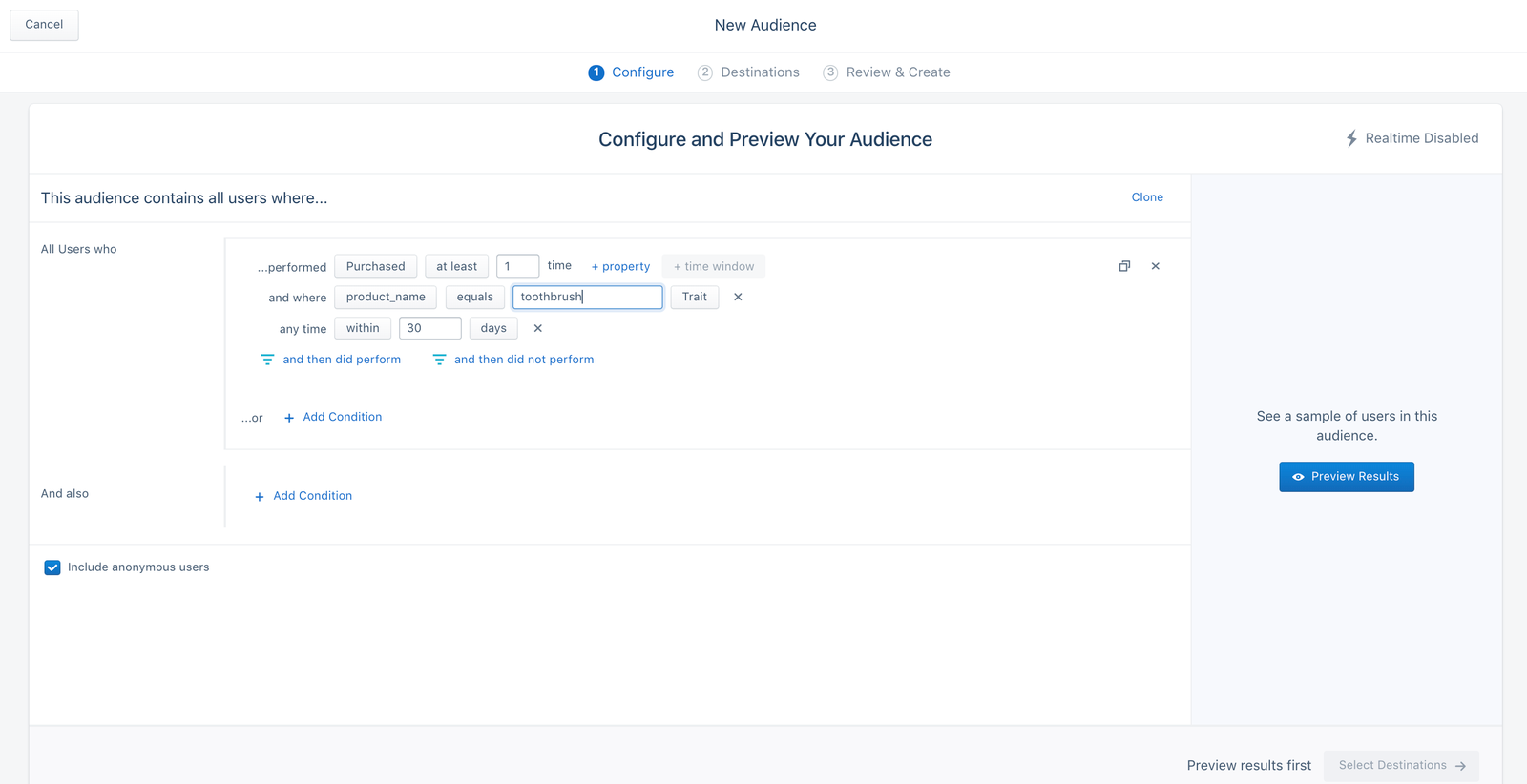
Click Preview to see if things look correct.
Click Select Destination and select the Facebook destination we added in step 1.
Name your audience something like Customers - toothbrush 30 days and click Create Audience. Make sure to leave the Gather historical data checkbox toggled on.
You’re done! Segment will now sync this live audience to your advertising account’s custom audiences list. This should take around ten minutes (or longer if your list is hundreds of thousands of people in size).
Step 3: Verify audiences in your ad platform
Now, let’s verify that your audience is synced. Here's how to do it for Facebook:
Log in to your Facebook Business Manager.
From the nav menu, select Audiences.
Locate the Facebook audience you had set up with Personas. Click into it to verify it looks correct by checking its History.
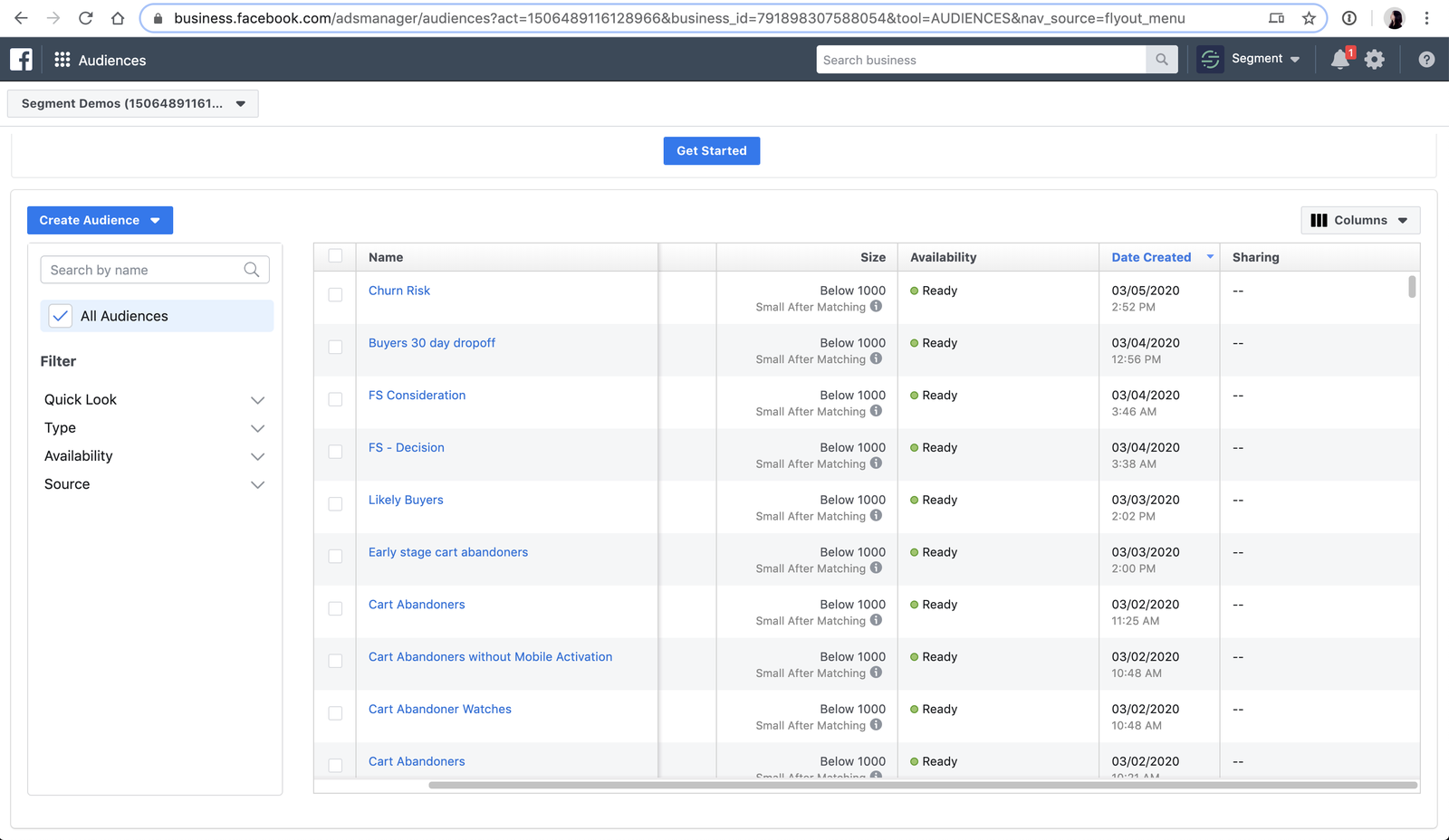
Step 4: Create a Lookalike Audience (Facebook)
Now that we’ve synced our audiences to Facebook via Segment, it’s time to create a lookalike audience. You can do this via Lookalike Audiences in Snapchat, Actalike Audiences in Pinterest, or Similar Audiences in Google Ads.
From the Audiences screen from the last step, choose Create Audience > Lookalike Audience.
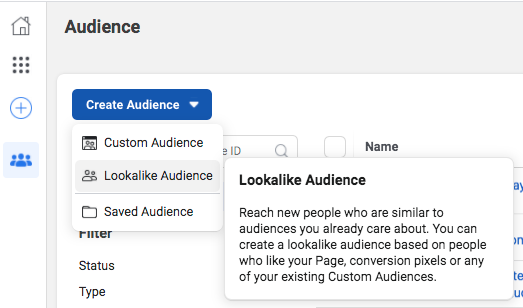
Under Select Your Lookalike Source, click into it, and select the Other Sources tab. Scroll through the list to select your customer list.
Moving on, under Select Audience Location, select the country you’re targeting. e.g. United States
For Select Audience Size, choose 1%. Going any higher would dilute the efficiency of the targeting.
Click Create Audience.
Step 5: Using the audiences in campaigns
That’s it! We now have all our custom audiences ready to use. Now it’s time to put them into practice. Here are two campaigns you can run.
Suppressing ads for people that have already purchased
From your FB Ads Manager, navigate to the ad set you want to modify and click the edit icon.
Under the Audience settings where you had set up your targeting, locate the Custom Audiences subsection.
Click `Exclude` and start typing the name of your custom audiences list and select it.
You’re done. Click `Publish` when you’re ready to implement the changes.
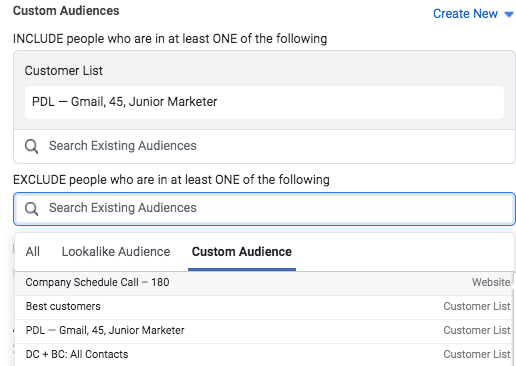
Creating lookalike ad sets
From your FB Ads Manager, create a new ad set by clicking the big green Create button.
Give it a name like Lookalike Purchasers - 1% US.
Scroll to the Audience > Custom Audience section.
Start typing the name of your custom audience and select it.
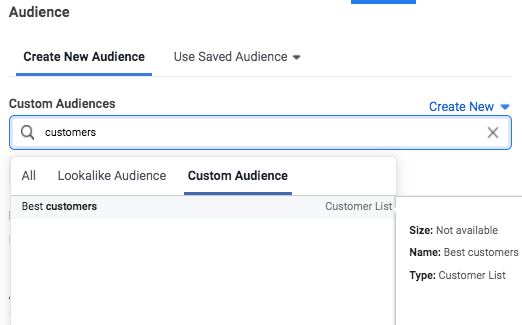
Set up the rest of the ad set as normal.
Click Publish.
Getting more granular with lookalike audiences
We’ve covered the fundamentals of setting up custom audiences using Twilio Engage. Now it’s time to dive into advanced uses for Engage’s power.
Instead of creating a lookalike audience from all of your existing customers, you can segment them more narrowly for better ad targeting: For example, you can make one lookalike audience for your high spenders, and one for your budget shoppers.
You can easily do this by leveraging Engage’s calculated traits feature. For example, you can compute the sum of every customer’s total purchases to create a “big spender” custom audience in real-time.
First, you’d define a computed trait to calculate:
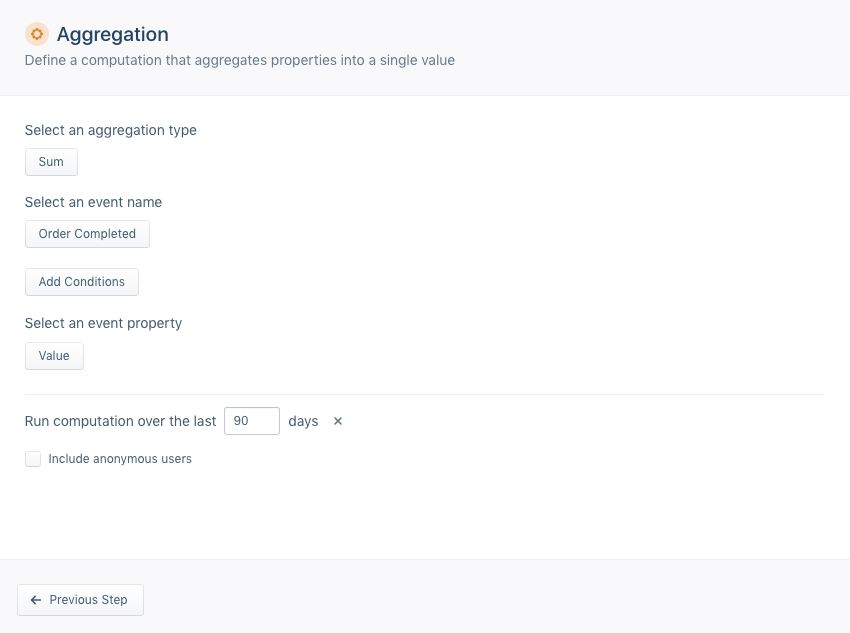
Then, you’d create a custom audience from this computed trait:
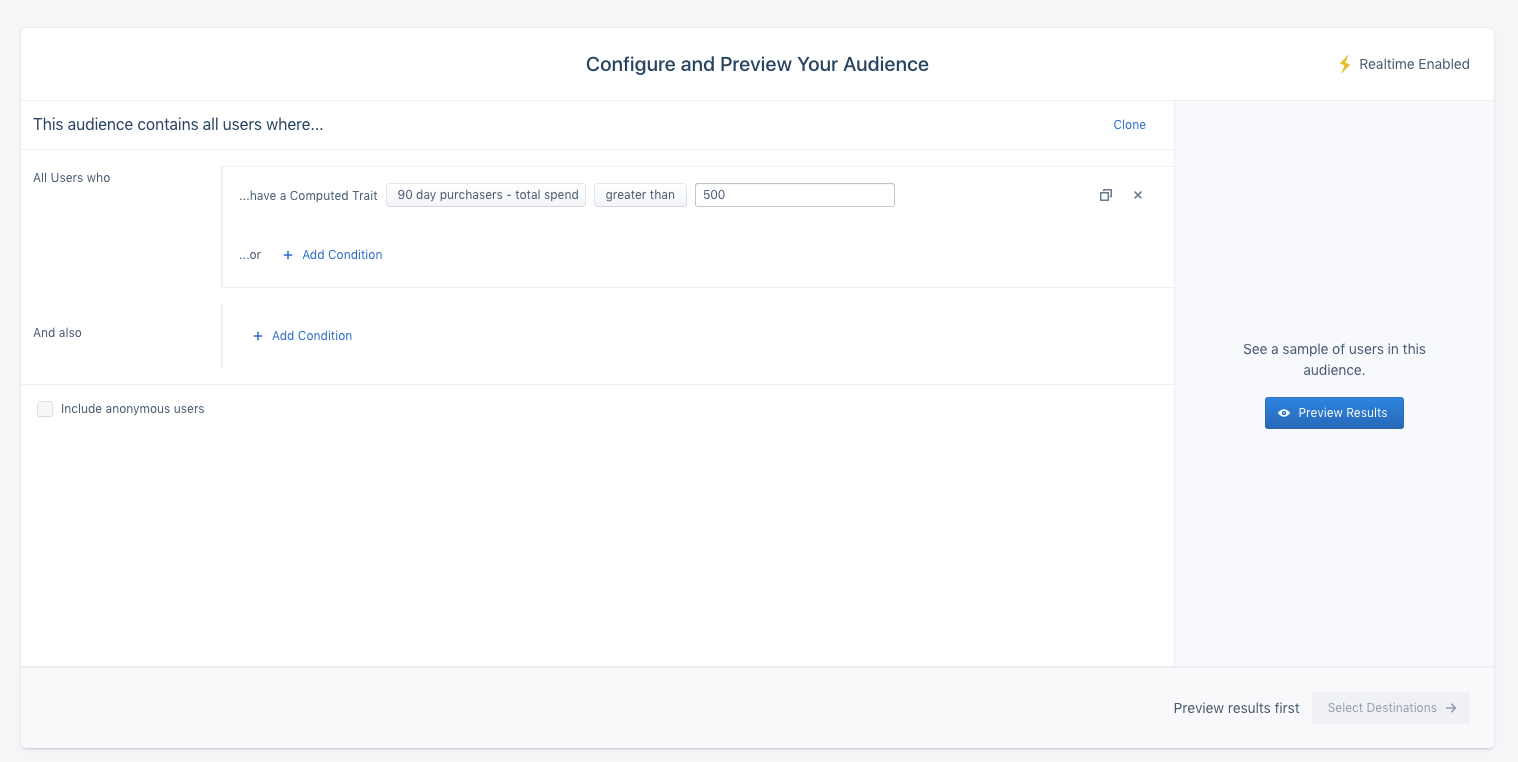
Then, simply follow the same steps from earlier in the article, so you have a hyper-specific audience with which to target.
Try this recipe for yourself...
Get help implementing this use case by talking with a Segment Team member or by signing up for a free Segment workspace here.
Getting started is easy
Start connecting your data with Segment.



